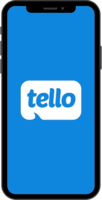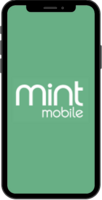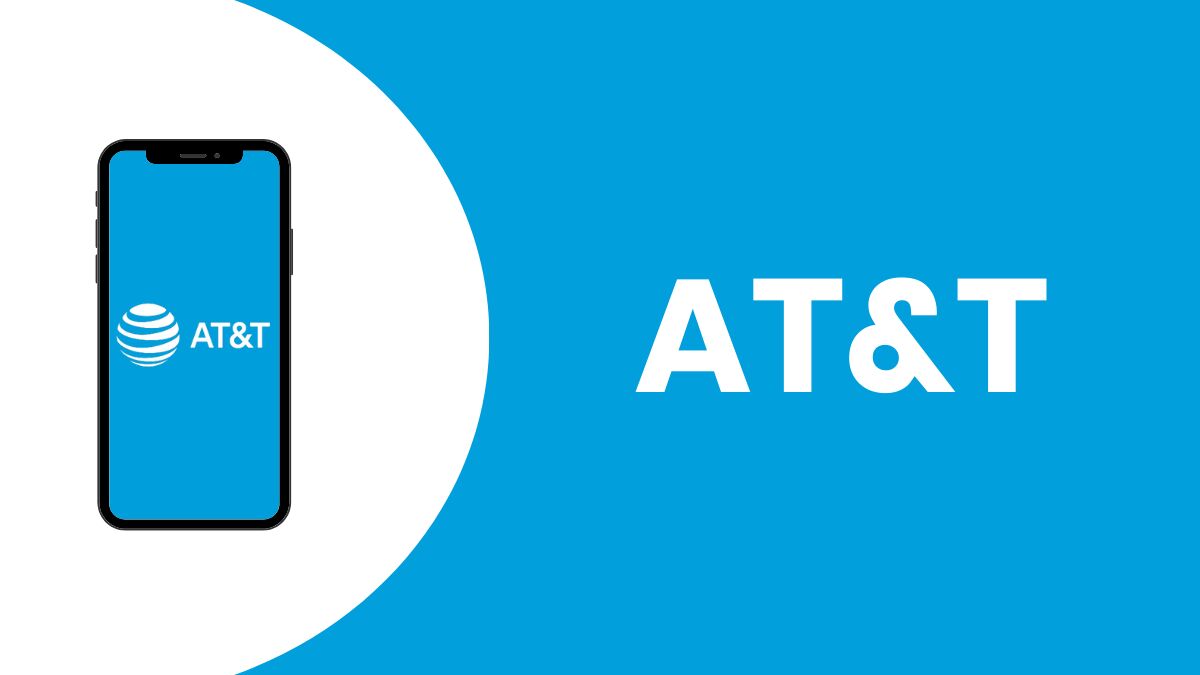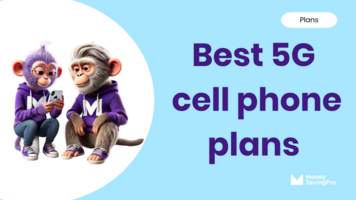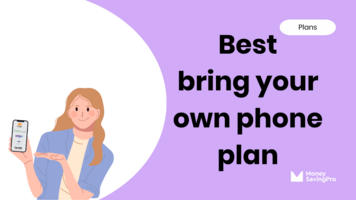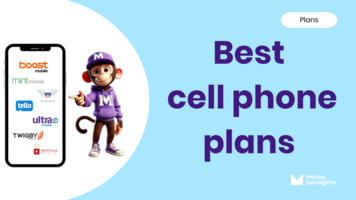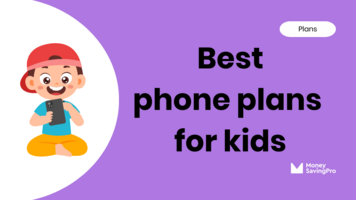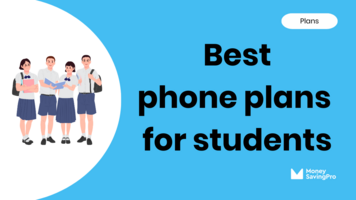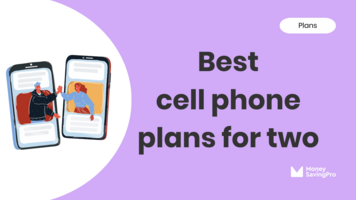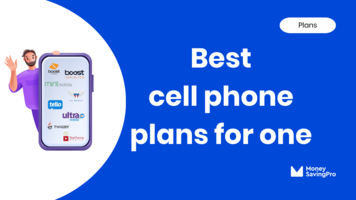How to choose the best GSM carrier
What network coverage do you prefer?
Network access is a key consideration wherever you live, but especially in rural areas. Luckily, low-cost carriers operate on the same 5G & 4G LTE networks as major carriers. T-Mobile scores the highest for 5G coverage, according to an Opensignal 5G Experience Report (2023). If there is a particular network you prefer, choose an MVNO that operates on that network. Use our coverage checker to find the best cell phone service in your area.
How much data do you need?
Do you really need an unlimited data plan? The big wireless companies want you to believe so, but in reality, the average monthly cellular data consumption is around 10GB. However, if you spend most of your time at home or work on Wi-Fi, it's likely your cellular data usage will be much lower. You can choose a data plan tailored to your needs with cheap cell phone providers, meaning you can pay less if you use less. But if you do choose an unlimited data plan, be aware that high-speed data is normally capped.
Is hotspot data included?
Most carriers allow hotspot data usage but limit the amount of data that can be used via tethering. The limit depends on the carrier and plan you choose. Some carriers also offer data only plans so you can access the internet on mobile devices like iPads, tablets, and mobile hotspots when Wi-Fi's not available.
What's the monthly price?
While big wireless unlimited plans cost around $75-90 per month, the best MVNOs offer budget-friendly plans, ranging from $5-35 per month without sacrificing wireless coverage and data speeds. Watch out for hidden fees & taxes; some carriers include these in the price, and others, such as Verizon and AT&T, don't.
How many lines do you need?
With big wireless, you only get the advertised price if you buy four lines. With MVNOs, the price you see is the price you pay, even for one line. Many low-cost carriers now offer further discounts for multi-line plans.
Can I bring my own phone or buy a new device?
While the big three love keeping their customers locked into a constant phone upgrade cycle, MVNOs encourage you to bring your own phone. This means you take back control and only change your phone when it suits you. If you do want to purchase a new phone, many MVNOs offer an affordable and easy way with 0% financing over 1-2 years.
Are there any deals or promotions?
Big wireless promotions can seem good at a glance. But once you read the small print, it often leads to buying things you don't need and committing to 3-year phone contracts. Many MVNOs offer short-term introductory promotional pricing for new customers, and their pricing is much more transparent.
What perks or add ons can I expect?
Most big wireless plans include "free" TV subscriptions. Initially, these seem like a great deal. However, these usually turn into a paid subscription that is automatically added to your bill a few months down the line. A few low-cost carriers, such as US Mobile, do offer plan options with free subscription services, but we generally recommend keeping these subscriptions separate so you don't end up paying for things you don't need.
Is international calling included?
Most MVNOs offer free international calls to many countries. If this is important to you, make sure to choose a carrier that includes this.
Are there parental controls?
Some Mobile Virtual Network Operators (MVNOs) provide parental controls that allow parents to monitor their children's cell phone usage and data consumption. By using these features, you have the ability to establish limits on data usage, limit access to specific apps or websites, and even keep track of your child's whereabouts. These capabilities are accessible either through subscription plans or can be adjusted in the settings of your mobile device.
Check out our cell phone plan comparison to ensure you find the best deal.
GSM carriers on T-Mobile
Boost Mobile
Boom! Mobile
Consumer Cellular
FreeUP Mobile
Metro by T-Mobile
Mint Mobile
Red Pocket
Straight Talk
Tello
TextNow
Tracfone
Ultra Mobile
US Mobile
Good2Go Mobile
Reach Mobile
Lycamobile
Kroger Wireless
Optimum Mobile
Boost Infinite
WOW! Mobile
Gotalk Wireless
GSM carriers on AT&T
Boost Mobile
Cricket Wireless
Freedompop
PureTalk
Red Pocket
Straight Talk
Tracfone
US Mobile
Good2Go Mobile
Boost Infinite
GSM network coverage
Which prepaid carrier is best for you? That depends on which network has the best coverage in your area.
Whether you go with a GSM carrier (T-Mobile and AT&T) or a CDMA carrier (Verizon) you'll enjoy national coverage, just like with the major carriers.
What is the GSM network?
GSM - or Global System for Mobile Communications - is a mobile network that is used worldwide, unlike CDMA which is used mainly in the US. It is the most popular cell phone technology and it is much easier to swap between phones on GSM networks as your information is stored on a SIM card.
Since it started GSM has evolved much faster than CDMA and 4G LTE is a GSM standard which means that both Verizon and Sprint are now using GSM technology on their previous CDMA phones. GSM, along with CDMA, is the technology that fills the gap when your 4G signal drops.
What is a GSM SIM card?
A SIM (subscriber identity module) card is what is provided to you by your carrier when you sign up to one of their plans. It has a unique identification number and holds your phone information, like your contacts and personal data.
The GSM SIM card makes it easy to switch between phones as you can just take it out from one phone and pop it into your new phone. Some older devices may still be locked to your current provider, so you will need to make sure they are unlocked before changing over.
When it comes to SIM cards, there are three types of SIM - standard SIM, micro SIM, and Nano-SIM. The type of SIM card you will need depends on your phone, but the most common is the Nano SIM.
Which is better CDMA or GSM?
This can still be a confusing topic for consumers, and it's really more of a personal preference when it comes to CDMA and GSM.
It's easier to swap phones with a GSM phone as the information is stored on a SIM card, and GSM carriers do not have as much control over the phone used. With CDMA, you need the permission of your carrier.
Whether you have a CDMA phone or a GSM phone, you can find the best low-cost carriers for both networks.
Find the best cell phone service in your area
Compare the cheapest GSM phone plans
| Carrier | Network | Data | Price |
|---|---|---|---|
| Tello 5GB plan | T-Mobile 5G/4G Coverage | 5GB | $10/mo |
| US Mobile 10GB plan | Verizon, AT&T & T-Mobile 5G/4G Coverage | 10GB | $18/mo |
| Boost Mobile unlimited data plan | AT&T & T-Mobile 5G/4G Coverage | Unltd | $25/mo |
| Tello unlimited data plan | T-Mobile 5G/4G Coverage | Unltd | $25/mo |
| Red Pocket 1GB plan | Verizon, AT&T & T-Mobile 5G/4G Coverage | 1GB | $10/mo |
GSM carriers FAQs
AT&T operates on the GSM network. AT&T unlocked phones should work with GSM carriers.
T-Mobile operates on the GSM network. T-Mobile unlocked phones should work with GSM carriers.
Verizon operates on the CDMA network. Verizon unlocked phones may only work with CDMA carriers.
Recap
There's a wide variety of the best cell phone plans available on the GSM network, with carriers like Mint Mobile, Tello, and Boost Mobile, to name just a few, that can save you money.
If you're looking to bring your own phone, as long as it's compatible, you can easily switch between carriers.
If you've got a CDMA phone without a SIM card slot, there are plenty of low-cost options to upgrade your handset, with most MVNOs offering 0% finance plans over two years.
Carrier guides
- The 5 Best Cell Phone Carriers
- Best eSIM Carriers
- The 5 Best Cheap Cell Phone Providers
- The 5 Best Cell Phone Service
- The 5 Best Prepaid Phone Companies
- The 5 Best Cheap Prepaid Phone Providers
- The 5 Best Prepaid Cell Phone Service
- The 5 Best Wireless Phone Companies
- Best Switch Carrier Deals
- The 5 Best 5G Phone Companies
- The 5 Best CDMA Carriers


